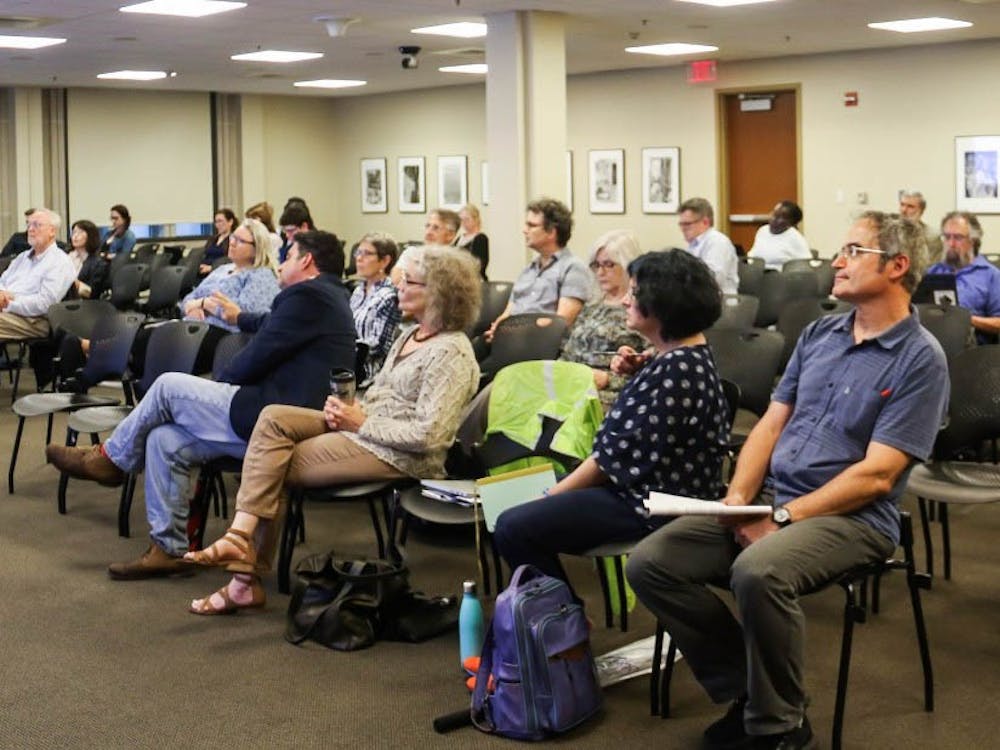The Arts and Sciences Council still needs advice on advising.
José María Rodríguez García, chair of the council and associate professor of romance studies, opened the Thursday meeting by bringing up the Council’s discussion from last year on finding ways to connect students to advisors while helping them feel less overwhelmed with options. At that meeting, García reconvened the Committee on Faculty and Student Interaction, which had been active for a short period of time more than a decade earlier.
“We have lots of students whose well-being is of concern to us because this is a high-pressure environment,” García said on Thursday. “And we need to have mechanisms in place to actually continue to encourage students to explore as much as they want, but without being over-stressed in the process.”
There were four presentations on how Duke can improve the advising network for undergraduates.
Professor of biology François Lutzoni spoke about his experience advising Native American students and referenced a January column published in The Chronicle calling for the University to “do more” for native students.
“By default, we are excluding, actively, Native students from an education at Duke,” Lutzoni said.
Lutzoni added that there has been progress in the wake of the column, such as the creation of Duke Native American/Indigenous Alumni and a space in the Center for Multicultural Affairs for Native students. However, he thinks there is much progress to be made.
“We are all aware of the Dakota Access pipeline, and there is also this emergence of Native American culture with environmental issues,” he said. “And I could see how, Duke, we could play a really important role there if we have the right faculty and many more students coming in.”
Charmaine Royal, a member of the Committee on Faculty-Student Interaction, related to her own college experience in her presentation, when she decided to no longer pursue the pre-medical track during her senior year.
“Every year I kept saying, I’m gonna drop this, cause I don’t like it … When I got to senior year, I’m like, ‘Now I’m dropping this,’” she said.
She chose to study microbiology instead, which took her two extra years but introduced her to genetics—the field in which she still works today.
Royal, an associate professor of African and African American studies, biology, global health, and family medicine and community health, spoke about the importance of helping students with interdisciplinary interests or who want to change their course of study. She also emphasized giving those students tools to use their classroom experience in the real world.
Sophomore Catherine McMillan, who wrote a column in The Chronicle about pre-professionalism at Duke, emphasized that students don’t have to come into college knowing what they want to do for a living. She argued Duke should make it easier for students to connect with professors.
“It’s very important to establish your network as a student. That’s something that I learned first-hand,” she said. “Not all students are as bold as me, or are as willing to just organize meetings, approach professors after class to talk about things that interest me, and I think that’s an important discrepancy that is lost in the advising network.”
Rachelle Macon, professor of military science and chair of the Duke-NCCU Army ROTC program, provided concrete suggestions from the perspective of someone involved with ROTC.
Macon noted that ROTC emphasizes connection between students and their faculty advisors. She suggested that Duke build on the Focus and First-Year Advisory Counselor programs, perhaps by introducing mandatory half-credit freshman seminar classes with faculty advisors.
“[It’s] just one idea, as we look at what we do in a small, very specific instance, that we might be able to take to a higher level,” she said.
In other business
Matt Serra, director of the Office of Assessment and lecturing fellow of psychology and neuroscience, took part in a Q&A with Christina Williams, professor of psychology and neuroscience. He discussed course evaluations, the online forms that students use to rate classes at the end of the semester.
“Course evaluations suck,” he admitted.
However, he said that there were ways to make them better. For example, the forms could include questions to which only students will see the answers, tailoring the assessments for students who use them to pick courses. This could in turn increase the number of students who fill out course evaluations.
Editor's Note: This article has been updated to remove information about Native American students from 2016, not present day.
Get The Chronicle straight to your inbox
Signup for our weekly newsletter. Cancel at any time.
Matthew Griffin was editor-in-chief of The Chronicle's 116th volume.

